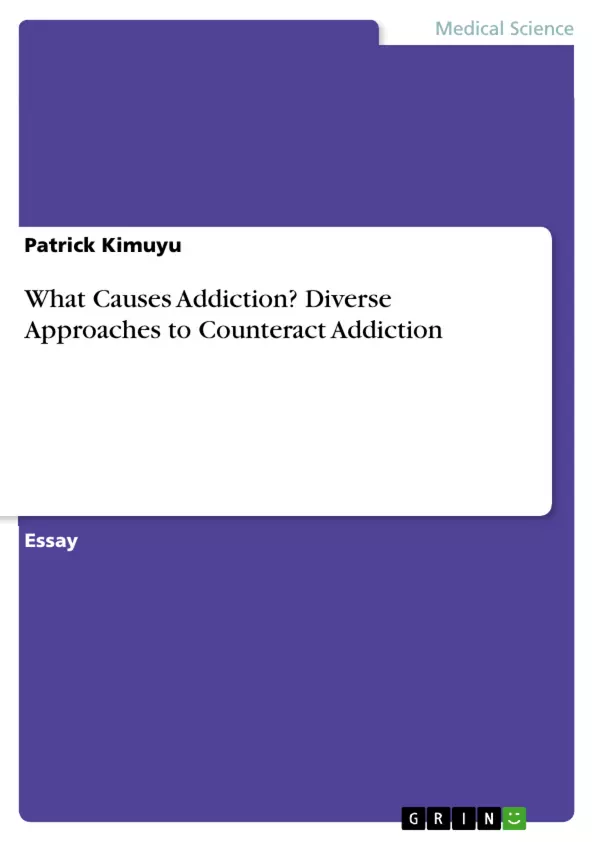Drug addiction appears to have become an enormous challenge to the global public healthcare systems. It has also raised ethical issues among the global population, especially regarding the menace of drug smuggling and abuse that has led to the increase of the prevalence rates of addiction to various drugs. One of the most challenging drug abuse related issue is the dual-diagnosis, also known as co-occurring disorder. This condition presents immense challenges to psychotherapists because its management requires multidimensional approaches to address the symptoms of the involved addictions. As a result, this issue has raised concern among psychologists and other professionals such as neuroscientists leading to extensive research on the causes of addiction. Therefore, the ambiguous question in the minds of most professionals is; “what causes addiction, and what is the best approach to counteract it?” This question is what this paper will answer by presenting a persuasive argument on the effect of dopamine in cocaine addiction.
Inhaltsverzeichnis (Table of Contents)
- Introduction
- Cause of Cocaine Addiction
- Positive Reinforcement in Cocaine Addiction
- Best Approach to Counteract Addiction
- Conclusion
Zielsetzung und Themenschwerpunkte (Objectives and Key Themes)
This paper explores the causes of cocaine addiction and examines the most effective approaches to counteract it. The paper aims to present a persuasive argument on the role of dopamine in cocaine addiction.
- The role of dopamine in cocaine addiction
- The influence of positive reinforcement in cocaine addiction
- The interplay between genetic and environmental factors in addiction
- The effectiveness of behavioral treatment approaches in counteracting addiction
- The importance of breaking habitual cocaine exposure to prevent addiction
Zusammenfassung der Kapitel (Chapter Summaries)
- Introduction: Introduces the issue of drug addiction, particularly cocaine addiction, as a significant challenge to global healthcare systems. The paper highlights the dual-diagnosis phenomenon and its implications for treatment. It poses the central question: what causes addiction, and what is the best approach to counteract it?
- Cause of Cocaine Addiction: Discusses the prevailing theory that addiction arises from a combination of genetic and environmental factors. However, the paper emphasizes the crucial role of dopamine build-up in the brain, particularly in the context of cocaine abuse. This build-up, driven by long-term exposure to cocaine, is attributed to the drug's impact on specific brain areas.
- Positive Reinforcement in Cocaine Addiction: Explores the concept of positive reinforcement as a key driver of the transition from cocaine abuse to addiction. The paper highlights how cocaine's reinforcing effects lead to loss of control and the development of compulsive behavior. The role of conditioned stimuli and their impact on the brain's reward system are also discussed.
- Best Approach to Counteract Addiction: Examines various approaches to counteracting cocaine addiction, including community-based interventions and behavioral therapies. The paper advocates for behavioral treatment approaches, such as cognitive behavioral therapy and contingency management, as effective strategies for breaking habitual cocaine exposure and mitigating the reinforcing mechanisms associated with addiction.
Schlüsselwörter (Keywords)
Cocaine addiction, dopamine, positive reinforcement, behavioral treatment approaches, cognitive behavioral therapy, contingency management, dual-diagnosis, habitual exposure.
Frequently Asked Questions
What is the primary cause of cocaine addiction according to this paper?
While addiction arises from a mix of genetic and environmental factors, the paper emphasizes the buildup of dopamine in the brain caused by long-term cocaine exposure as a central cause.
What does "dual-diagnosis" or "co-occurring disorder" mean?
It refers to the condition where an individual suffers from both a substance addiction and a mental health disorder simultaneously, requiring multidimensional treatment.
How does positive reinforcement contribute to addiction?
Cocaine triggers the brain's reward system, creating a cycle of positive reinforcement that leads to loss of control and compulsive drug-seeking behavior.
What is the best approach to counteract cocaine addiction?
The paper advocates for behavioral treatment approaches, such as Cognitive Behavioral Therapy (CBT) and contingency management, to break habitual exposure.
Why is breaking habitual exposure important?
Breaking the habit is essential to mitigate the reinforcing mechanisms in the brain and prevent the cycle of addiction from continuing.
- Quote paper
- Patrick Kimuyu (Author), 2016, What Causes Addiction? Diverse Approaches to Counteract Addiction, Munich, GRIN Verlag, https://www.grin.com/document/381307



